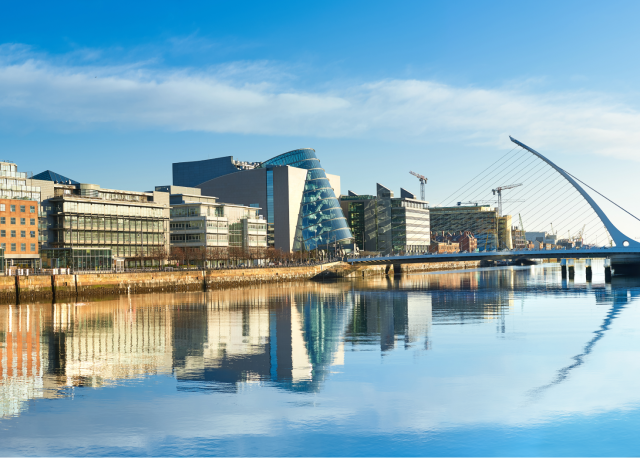Ireland’s favorable tax environment, highly skilled labor force, and connections to the European market make it an attractive location for companies looking to expand overseas.
The country offers a low corporate tax rate of 12.5%, has one of the world’s youngest, most educated workforces, and has proven its resiliency amid recessions. In fact, international companies based in Ireland experienced significant throughout the COVID-19 pandemic.
Facebook, Google, and Intel are among the many multinational corporations with regional headquarters in Dublin, taking advantage of the numerous benefits this country has to offer.
Read on to discover four reasons why global companies are moving to Ireland. Plus, find out how to simplify expansion to this country while eliminating risk.
4 Reasons Why Ireland Is an Attractive Location for Global Companies
1. Ireland’s Corporate Tax Rate Is One of Europe’s Lowest
In 2003, Ireland lowered its corporate tax rate to 12.5%—one of the most business-friendly rates in the region.
This rate is well below the average of 21.7% among European countries of the Organisation for Economic Co-operation and Development (OECD).
Ireland’s tax rate is significantly lower than many of the other common global markets in Europe, including:
- France: 25%
- Germany: 15.8%
- Luxembourg: 25%
The “Emerald Isle” follows only Hungary (9%) for the lowest tax rate of European OECD countries.
The low tax rate makes Ireland a highly attractive location for global companies looking for a cost-efficient operations base in Europe.
The following businesses are among many global companies with production facilities, research and development centers, or administrative offices in Ireland:
- Pfizer
- Merck
- Novartis
- Johnson & Johnson
Additionally, Ireland has tax treaties with several strong markets worldwide, including the United States, United Kingdom, China, Japan, Australia, and Canada. Plus, it offers a 25% research and development tax credit.
Altogether, the Irish tax environment is highly attractive for global organizations.
2. Ireland Is Home to a Highly Skilled Workforce
Ireland is known worldwide for its strong workforce. Thanks to its quality education system, the country develops the talent that multinational corporations in various sectors, such as tech and medicine, need to support their operations.
Naturally, many businesses choose to establish a local presence in the country to source talent from Ireland’s highly skilled workforce.
Ireland’s Quality Education System Develops Top Talent
Today, Ireland has a higher percentage (98%) of 18-year-olds in education than any other European country, and a recent survey by the Campus Advisor found that Ireland was the fifth-highest-ranking country worldwide for higher education quality.
Many local universities and colleges have founded artificial intelligence (AI) or tech programs in recent years, some in partnership with tech companies themselves, such as Trinity College and Huawei. Other institutions like University College Cork and Tyndall National Institute have recently launched accelerator programs for Irish startups.
As a result, Ireland is home to a highly skilled workforce equipped with the skills to compete in an increasingly digital world, particularly in the AI and information technology (IT) sectors.
Global Companies Value Irish Talent
Facebook, Google, LinkedIn, Indeed, IBM, and Microsoft are among the many global tech organizations that have taken advantage of Ireland’s strong talent pool and chosen the country as their European home base.
In the past five years, Intel has invested €17 billion in their Irish manufacturing plant in Kildare, doubling their total investment in the country over the past 30 years and creating 1,600 high-tech jobs as part of the plan—a testament to their trust in the country’s tech-savvy workforce.
Ireland’s highly skilled workforce has such a strong reputation worldwide that many global companies even acquire top local talent abroad.
3. Brexit’s Positive Economic Impact on Ireland
While the U.K.’s departure from the European Union (EU) has created complications, it has led to new opportunities for well-developed, English-speaking countries like Ireland.
Now separate from the EU, London is no longer the de-facto financial capital of Europe, and many global companies, such as Stripe and JP Morgan, have moved their headquarters from the U.K. to Ireland.
Why Companies Choose Ireland Over Other European Locations
Dublin offers several benefits to global companies leaving the U.K. seeking other European locations as their home base, such as:
- An established financial center. Dublin is already an established financial center home to over 1,000 global firms.
- No language barrier. Ireland and Malta are now the EU’s only two official English-speaking countries.
- Attractive regulatory framework. The country’s long history of serving as a base for overseas companies and talent means it has a regulatory framework that is friendly to foreign businesses and talent seeking to relocate and work in Ireland on work visas.
A recent survey by global consulting agency EY found that many financial firms relocating to Europe from London chose Dublin over other noted international commerce destinations, such as Luxembourg, Frankfurt, and Paris.
Companies That Have Moved From the U.K. to Ireland
The list of financial companies that have chosen to move to Ireland from the U.K. since Brexit includes:
- Barclays
- Coinbase
- Morgan Stanley
- S&P Global
- Equilend
- JP Morgan
Fintech giant Stripe, valued at $50 billion, moved its headquarters from the U.K. to Ireland in late 2020, making Dublin the new home for its processing center for all customers outside the U.K. and Switzerland.
Stripe quickly doubled its Irish headquarters’ staff and has successfully used the city as a launchpad to roll out its services to the rest of Europe ever since.
4. Easy Access to Other European Markets
One of the main reasons businesses expand overseas is to gain access to new, lucrative markets.
Any company that expands to Ireland gains immediate access to Europe's most substantial economic block and one of the biggest markets for global consumers: the European Union (EU).
Organizations operating within the EU enjoy numerous benefits, such as:
- The ability to export goods to nearly any market worldwide
- Protection from external competition from foreign markets, such as Asia and Africa
- A vast market that ensures that whatever goods or products a company provides, they will always have a market in which to sell them
In a recent Economist Intelligence Unit report, 46% of respondents highlighted “access to EU markets” as the most important competitive advantage of doing business in Ireland.
Respondents prioritized Ireland’s strategic location over other key advantages, including access to local skills and the country’s low corporate tax rate.
Simplify Expansion to Ireland With an Employer of Record
Many overseas organizations that expand to Ireland realize they can scale their business in unprecedented ways from this country.
However, compliance risks and incorporation procedures deter many companies from ever making the move. Eliminate the headache by partnering with an employer of record (EOR).
An EOR provides legal counsel and local expertise to help companies navigate country-specific tax and employment regulations to test new markets quickly and cost-effectively without worrying about slow operational time or legal risks.
By partnering with an EOR in Ireland like Velocity Global, businesses can quickly enter the Irish market without foreign entity establishment, hire and pay local talent, generate new revenue streams, and reach new customers while ensuring full compliance.
Discover how we helped Global Eagle, a satellite-based broadband connectivity provider, quickly and compliantly expand into new markets while supporting its remote teams.
Achieve Your Global Growth Goals With Velocity Global
Rise above the complexities of entering new global markets with Velocity Global by your side. We help you scale your workforce, reach new customers, and grow your business without limits.
Contact us today to take the next step toward simplifying your expansion into Ireland and beyond.



